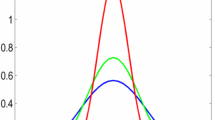Abstract
We present a generative Bayesian framework that automatically extracts the hubs of altered functional connectivity between a neurotypical and a patient group, while simultaneously incorporating an observed clinical severity measure for each patient. The key to our framework is the latent or hidden organization in the brain that we cannot directly access. Instead, we observe noisy measurements of the latent structure through functional connectivity data. We derive a variational EM algorithm to infer both the latent network topology and the unknown model parameters. We demonstrate the robustness and clinical relevance of our model on a population study of autism acquired at the Kennedy Krieger Institute in Baltimore, MD. Our model results implicate a more diverse pattern of functional differences than two baseline techniques, which do not incorporate patient heterogeneity.
Access this chapter
Tax calculation will be finalised at checkout
Purchases are for personal use only
Similar content being viewed by others
References
Fox, M.D., Raichle, M.E.: Spontaneous fluctuations in brain activity observed with functional magnetic resonance imaging. Nature 8, 700–711 (2007)
Di Martino, A., Yan, C.G., Li, Q., Denio, E., Castellanos, F., et al.: The autism brain imaging data exchange: towards a large-scale evaluation of the intrinsic brain architecture in autism. Mol. Psychiatry 19, 659–667 (2014)
Meunier, D., et al.: Hierarchical modularity in human brain functional networks. Front. Neuroinform. 3, 37 (2009)
Sporns, O., Zwi, J.: The small world of the cerebral cortex. Neuroinformatics 2, 145–162 (2004)
Horga, G., Kaur, T., Peterson, B.: Annual research review: current limitations and future directions in MRI studies of child- and adult-onset developmental psychopathologies? J. Child Psychol. Psychiatry 55, 659–680 (2014)
Venkataraman, A., et al.: From brain connectivity models to region labels: Identifying foci of a neurological disorder. IEEE TMI 32, 2078–2098 (2013)
Padmanabhana, A., et al.: The default mode network in autism. Biol. Psychiatry Cogn. Neurosci. Neuroimaging, 1–11 (2017, in press)
Jordan, M., Ghahramani, Z., Jaakkola, T.S., Saul, L.K.: An introduction to variational methods for graphical models. Mach. Learn. 37, 183–233 (1999)
Friston, K., et al. (eds.): Statistical Parametric Mapping: The Analysis of Functional Brain Images. Academic Press, London (2007)
Behzadi, Y., et al.: A component based noise correction method (compcor) for bold and perfusion based fMRI. NeuroImage 37, 90–101 (2007)
Cox, R.W.: AFNI: software for analysis and visualization of functional magnetic resonance neuroimages. Comput. Biomed. Res. 29(3), 162–173 (1996)
Tzourio-Mazoyer, N., et al.: Automated anatomical labeling of activations in SPM using a macroscopic anatomical parcellation of the MNI MRI single-subject brain. NeuroImage 15, 273–289 (2002)
Schipul, S., Keller, T., Just, M.: Inter-regional brain communication and its disturbance in autism. Front. Syst. Neurosci. 5, 10 (2011)
Vasa, R., Mostofsky, S., Ewen, J.: The disrupted connectivity hypothesis of autism spectrum disorders: time for the next phase in research. Biol. Psychiatry Cogn. Neurosci. Neuroimaging 1, 245–252 (2016)
Damoiseaux, J., et al.: Consistent resting-state networks across healthy subjects. PNAS 103, 13848–13853 (2006)
Mars, R., et al.: On the relationship between the “default mode network” and the “social brain”. Front. Hum. Neurosci. 6, 189 (2012)
Ament, K., et al.: Evidence for specificity of motor impairments in catching and balance in children with autism. J. Autism Dev. Disorders 45, 742–751 (2015)
Nebel, M., et al.: Disruption of functional organization within the primary motor cortex in children with autism. HBM 35, 567–580 (2014)
Bardi, L., et al.: TPJ-M1 interaction in the control of shared representations: new insights from tDCS and TMS combined. NeuroImage 146, 734–740 (2017)
Mostofsky, S., Ewen, J.: Altered connectivity and action model formation in autism. Neuroscientist 17, 437–448 (2011)
Becker, E., Stoodley, C.: Autism spectrum disorder and the cerebellum. Int. Rev. Neurobiol. 113, 1–34 (2013)
Acknowledgments
This work was supported in part by the National Institute of Mental Health (R01 MH085328-09, R01 MH078160-07, and K01 MH109766), the National Institute of Neurological Disorders and Stroke (R01 NS048527-08), and the Autism Speaks foundation.
Author information
Authors and Affiliations
Corresponding author
Editor information
Editors and Affiliations
Rights and permissions
Copyright information
© 2017 Springer International Publishing AG
About this paper
Cite this paper
Venkataraman, A., Wymbs, N., Nebel, M.B., Mostofsky, S. (2017). A Unified Bayesian Approach to Extract Network-Based Functional Differences from a Heterogeneous Patient Cohort. In: Wu, G., Laurienti, P., Bonilha, L., Munsell, B. (eds) Connectomics in NeuroImaging. CNI 2017. Lecture Notes in Computer Science(), vol 10511. Springer, Cham. https://doi.org/10.1007/978-3-319-67159-8_8
Download citation
DOI: https://doi.org/10.1007/978-3-319-67159-8_8
Published:
Publisher Name: Springer, Cham
Print ISBN: 978-3-319-67158-1
Online ISBN: 978-3-319-67159-8
eBook Packages: Computer ScienceComputer Science (R0)




